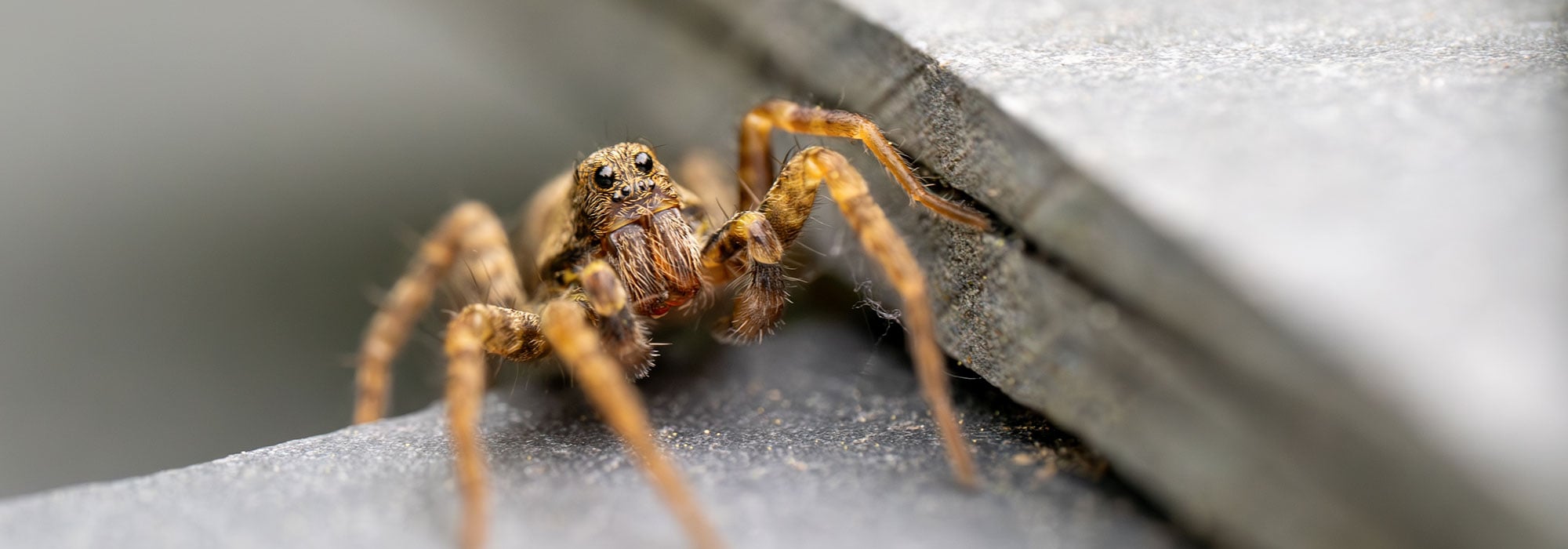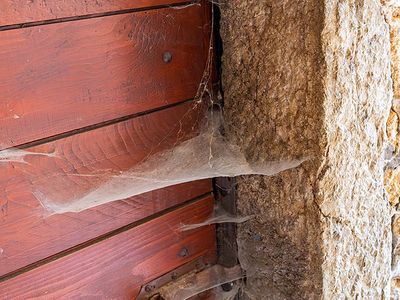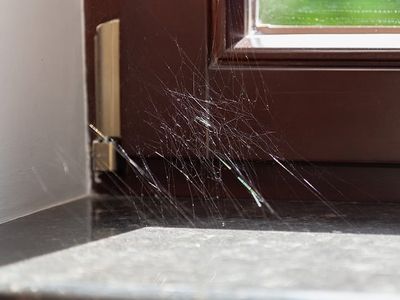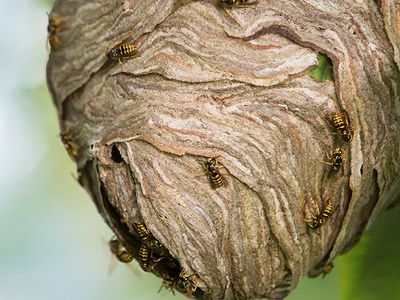South Carolina’s Pee Dee and Grand Strand regions are home to several types of venomous and non-venomous spiders. From harmless house spiders weaving webs in your windowsills to more concerning visitors like the venomous black widow, it’s fair to say arachnids are plentiful in our area. In this article, the local pest control specialists at Harris Pest Control will look at the most common spiders you might encounter, highlighting which ones to watch out for and which are more of a nuisance than a threat. We’ll also share helpful tips to keep spiders out and what to do if they have already invaded your home.
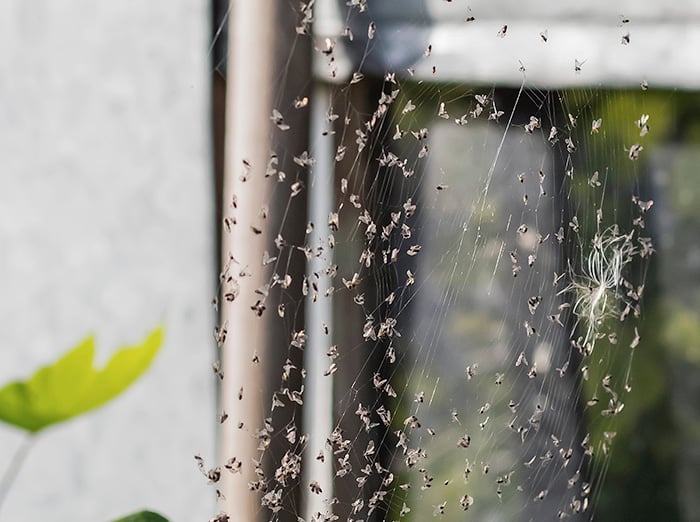
Black widow spiders
Female black widow spiders range in size, depending on the species. Most grow to be about 1 inch in length. The female is black and has a red hourglass shape underneath the abdomen. Male black widows are smaller and have brown coloration.
These spiders create tangled webs made of strong fibers. They typically build webs low to the ground and in concealed locations. Their preferred habitat is brush and vegetation. While they sometimes find their way indoors, most interiors are unsuitable long-term habitats.
Risk: The black widow is known for its potent venom. There is localized pain during envenomation, and the venom can cause medical symptoms:
- Stomach, chest, and back pain
- Chills
- Fever
- Nausea
- Vomiting
- Stupor
- Restlessness
- Shock
Not all bites lead to these symptoms, but seeking medical attention when bitten by a black widow is wise.
Brown recluse spiders
These are small brown spiders with a dark brown violin-shaped mark located on their backs. They range in size, but most grow to about ½ of an inch in length.
Brown recluse spiders are surprisingly adaptable. They can live outdoors or indoors. Large indoor populations have been discovered in the United States. You may find these spiders hiding in dark and secluded spaces. They build light webbing near the floor, but their webs are not for capturing prey. They use them for retreat.
Risk: While not prone to bite, a bite can become serious. Brown recluse venom has necrotic properties, which can cause skin to die. As is the case with black widows, we highly recommend seeking medical treatment if bitten by a brown recluse.
Common house spiders
These dirty brown spiders, also known as American house spiders, are common in U.S. households. They range in size from 1/8 to 5/16 of an inch.
A house spider will create many thin, wispy webs in your home. You'll likely find the webs in high locations or window voids because these spiders prefer to eat flies.
Risk: The venom of a common house spider is weak and presents no medical threat to humans. You'll most likely develop an itchy red bump if bitten.
Wolf spiders & jumping spiders
If you see a hairy spider in your home, it is likely a wolf spider or a jumping spider. Wolf spiders are large and hairy; they might even look a bit scary. Jumping spiders are small, hairy, and far less intimidating.
Both spiders are hunters. They don't create webs to catch their prey; they hunt at night and spring onto their prey. They often come indoors to track their food (i.e., insects).
Risk: These spiders bite but are not considered a medical threat for most individuals.
What time of year are spiders in South Carolina most active?
In Florence, Myrtle Beach, and throughout South Carolina, spiders are a year-round problem. Of course, activity fluctuates a bit with the seasons. Here's a breakdown of their activity:
- Spring
As temperatures rise, spiders become more active, so you might notice more spider webs and sightings around your home and on your property. This is also a time when some spiders begin to lay eggs, - Summer
Summer is the peak spider activity season in South Carolina. Our warm and humid climate encourages spiders to hunt, spin webs, and reproduce. You’ll likely see more spiders outdoors, as well as some making their way indoors. - Fall
Spider activity remains high in early fall, with many species reaching full maturity. This is also when spiders tend to mate, so you could see more arachnids out searching for mates. Some spiders may also move indoors seeking warmth. - Winter
During winter, spider activity slows down significantly. Some species go into a state of dormancy, while others may find shelter indoors, where temperatures are more stable.
If you want to prevent spiders from becoming an issue in your home regardless of the season, it’s important to focus on control and prevention measures.
How to prevent spider infestations
Now that you know more about the common spiders in our area, what can you do about them? Your first step is to consider ways to counteract their natural behavior patterns. Remove food sources, seal potential entry points, and limit population growth. Here are a few ways you can discourage spider activity.
When you control exterior lighting and keep trash cans covered, you reduce the number of flying pests. Flies are attracted to light and organic decay. Address these fly attractants, and you'll have fewer spiders.
Standing water in your yard can allow female mosquitoes to create a swarm. If they do, spiders will come running or crawling to eat them. Remove containers, address puddles, and clear out gutter clogs.
Spiders eat flies and mosquitoes, but they also enjoy dining on other insects, including flying insects and crawling pests. A moisture problem, leaf litter, dense vegetation, and other yard conditions attract bugs. Doing yard work can reduce the number of bugs and spiders that enter your yard looking for a meal.
When you go around the exterior of your home and remove webs, it can have a significant impact in two ways. First, web-building spiders often lay egg sacs in their webs, which can have hundreds of spider eggs inside. You'll stunt the spider population by removing the egg sacs. Second, by regularly removing webs, you’re potentially reducing the spiders’ food supply.
Installing or replacing worn-out weather stripping and door sweeps will make it harder for spiders and insects to enter your home. You should also seal other potential entry points, including, but not limited to, cracks in the foundation, gaps around doors and windows, and openings around utility lines. Don’t forget to check your crawl space – if the access door is not well-sealed, spiders can sneak in that way.
How our team eliminates spiders and other pests
At Harris Pest Control, we offer home pest control services that target spiders and a variety of other house-infesting pests. We offer multiple plans, all of which include exterior pest treatments, indoor service, if necessary, exterior de-webbing up to 15 feet, and fire control within 25 feet of your home. Compare plan features and pricing below.



Interested In Adding Moisture Control?
At Harris Pest Control, our 50+ years of industry experience have taught us that no two homes are the same.
If you're searching for a residential plan that includes a yearly moisture service, we've got you!
Or Call For Details (843) 665-4325
We also offer seasonal mosquito control!
Eliminating mosquitoes on your property discourages spiders and protects your family from mosquito bites and the potential transmission of mosquito-borne illness. Our seasonal mosquito control runs from April through September and includes monthly mosquito misting treatments that target adult mosquitoes flying around and disrupting mosquito reproduction.

